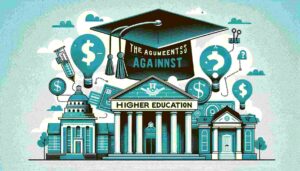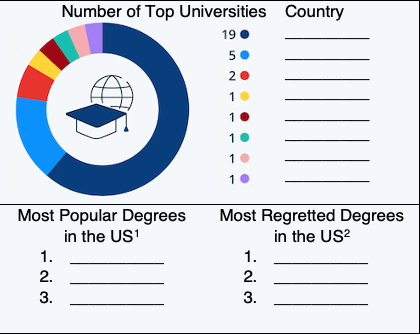Lesson Topics: college/university, educational reform
Skill Focus: Speaking, Reading, Vocabulary, Listening
Approximate Class Time: 2 hours
Lesson Plan Download: university-degree-value-advanced-lesson-112023.docx
Lesson Overview:
- After warm-up questions, students guess which countries have the most highly-ranked universities worldwide, which degrees are the most popular in the US, and which degrees are the most regretted.
- The reading passage is fairly short, at 271 words. It summarizes the reasons why interest in college in the U.S. appears to be on the decline. (The passage also contains some statistics about the UK to make it a little more inclusive). The article focuses on the high costs, the appearance of other educational options, and potential issues with bias.
- After a memory recall activity, students complete comprehension questions. This is followed by a vocabulary-matching exercise and an activity where students make questions using the target vocabulary.
- The first speaking activity is a debate either on the value of obtaining a degree or whether education should be free. Next, students imagine they are on a high education reform committee and suggest changes to the university system.
- The lesson includes two fun roleplays; the first is between a college applicant and an admissions officer, and the second is between an indebted student and a banker.
- As a bonus, the lesson includes a link to a short YouTube video (in BrE) about ways to make university worthwhile. Some discussion questions accompany the video.
- The lesson ends with a few famous quotations related to higher education, a final vocabulary review, final discussion questions, and a review of collocations.
Note: Perhaps confusingly, the terms 'college' and 'university' are used somewhat interchangeably in this lesson, despite having different meanings in different parts of the world.

ADVANCED (C1/C2) EFL Lesson Plan on Getting a Degree
Warm-up Questions
- Have you gone to university or college? If so, what was your experience like? If not, do you plan to?
- To what extent is having a university degree needed to have a successful career (or life)?
- Predicting: You are going to read about the arguments against attending college. What ideas do you think will be presented in the passage?
- This chart is from Statista’s ‘World University Ranking 2024’. It shows the number of top universities in each country. Which countries do you think represent each value? (Answers atop next page)

2) Is your home country’s education system highly ranked?
3) Place the below degrees into one of the tables on the right. Discuss your choices.
- Nursing
- Business
Journalism - Liberal Arts/General Studies
Psychology - Sociology
(Answers at bottom of next page)
Membership is required to view this post. Please support EnglishCurrent by becoming a member today. Members, please log in.
-- Lesson plan on the value of university written by Matthew Barton of EnglishCurrent.com (copyright). ChatGPT was used to suggest expressions for speaking activities and generate answer keys. Site members may photocopy and edit the file for their classes. Permission is not given to rebrand the lesson, redistribute it on another platform, or sell it as part of commercial course curriculum. For questions, contact the author.
Possible answers to follow-up questions:
- …
- …
- Many students take on a loan, which takes an average of 20 years to repay (in the U.S.).
- These costs could lead to a less socio-economically diverse student population. High costs may deter students from lower-income families from attending university, which could result in a student body that is predominantly from middle to higher-income backgrounds.
- The pandemic may have accelerated the adoption of online learning and alternative forms of education. With the need for remote education during lockdowns, students and institutions became more familiar with and reliant on digital platforms, which may continue to be popular due to their flexibility and lower costs compared to traditional in-person university education.
- The issue mentioned in the final paragraph concerns allegations of left-wing bias in university curricula. This perceived bias could potentially contribute to a decline in university attendance among conservative-minded individuals who may feel that the academic environment does not represent their viewpoints or that it is hostile to their beliefs.
- …
- …
Vocabulary Answers: 1-h, 2-b, 3-f, 4-e, 5-a, 6-d, 7-c, 8-g
Vocabulary Review Answers: See original passage
Collocation Answers: 1-d, 2-f, 3-e, 4-a, 5-c, 6-d,
Endnotes:
- [1] https://www.forbes.com/sites/michaeltnietzel/2022/02/16/what-are-the-most-popular-majors-for-prospective-college-students/?sh=3e57089c15d2
- [2] https://www.cnbc.com/2022/11/12/the-top-10-most-regretted-college-majors.html
- [3] https://news.gallup.com/poll/508352/americans-confidence-higher-education-down-sharply.aspx
- [4] https://study-uk.britishcouncil.org/moving-uk/cost-studying
- [5] https://educationdata.org/average-cost-of-college#:~:text=The%20average%20cost%20of%20attendance,or%20%24223%2C360%20over%204%20years.
- [6] https://educationdata.org/average-time-to-repay-student-loans
- [7] https://time.com/6265266/america-college-degrees-essay/
- [8] https://usprogram.gatesfoundation.org/news-and-insights/articles/gates-foundation-probes-college-enrollment-decline
- [9] https://www.insidehighered.com/opinion/views/2023/09/20/higher-ed-cant-afford-its-left-wing-bias-problem-opinion
